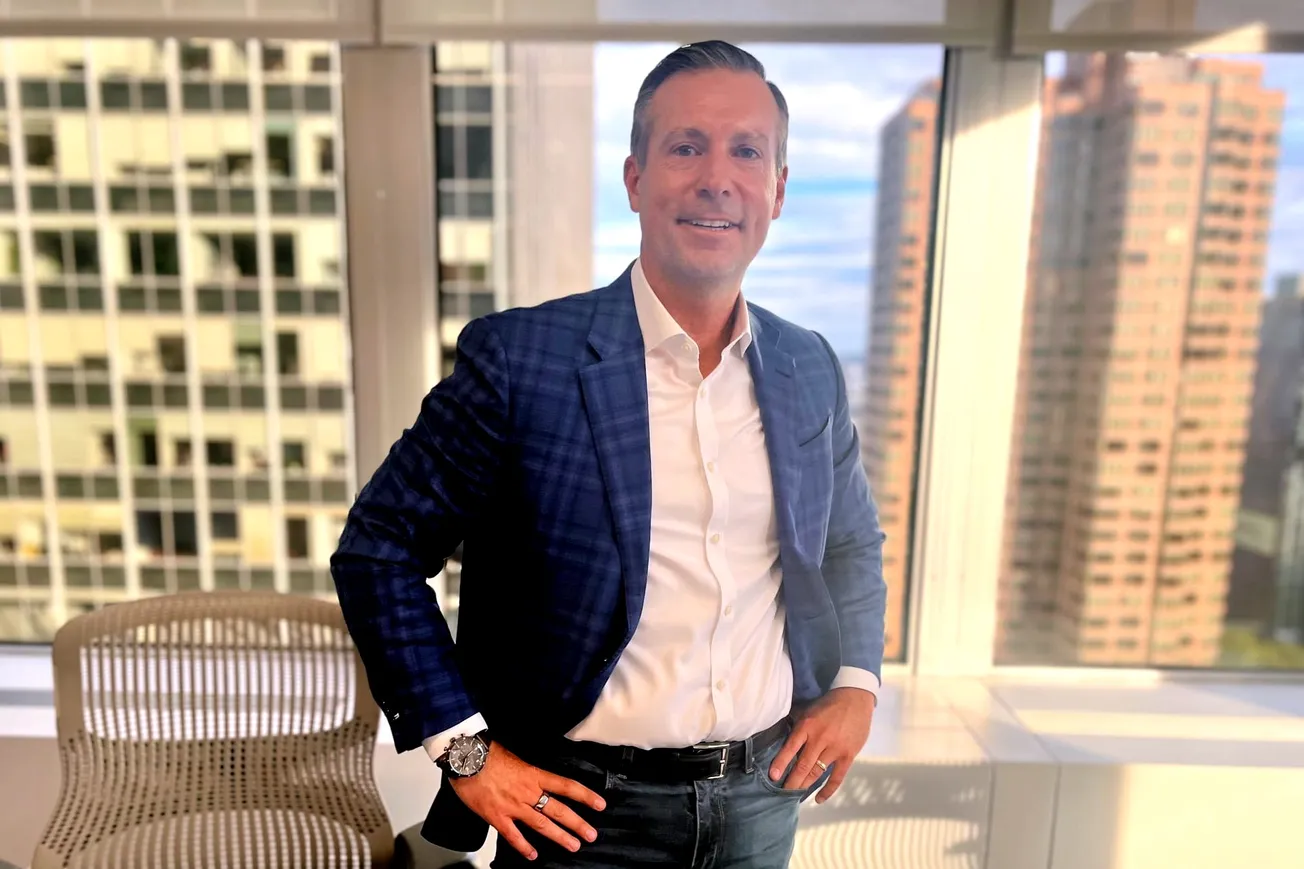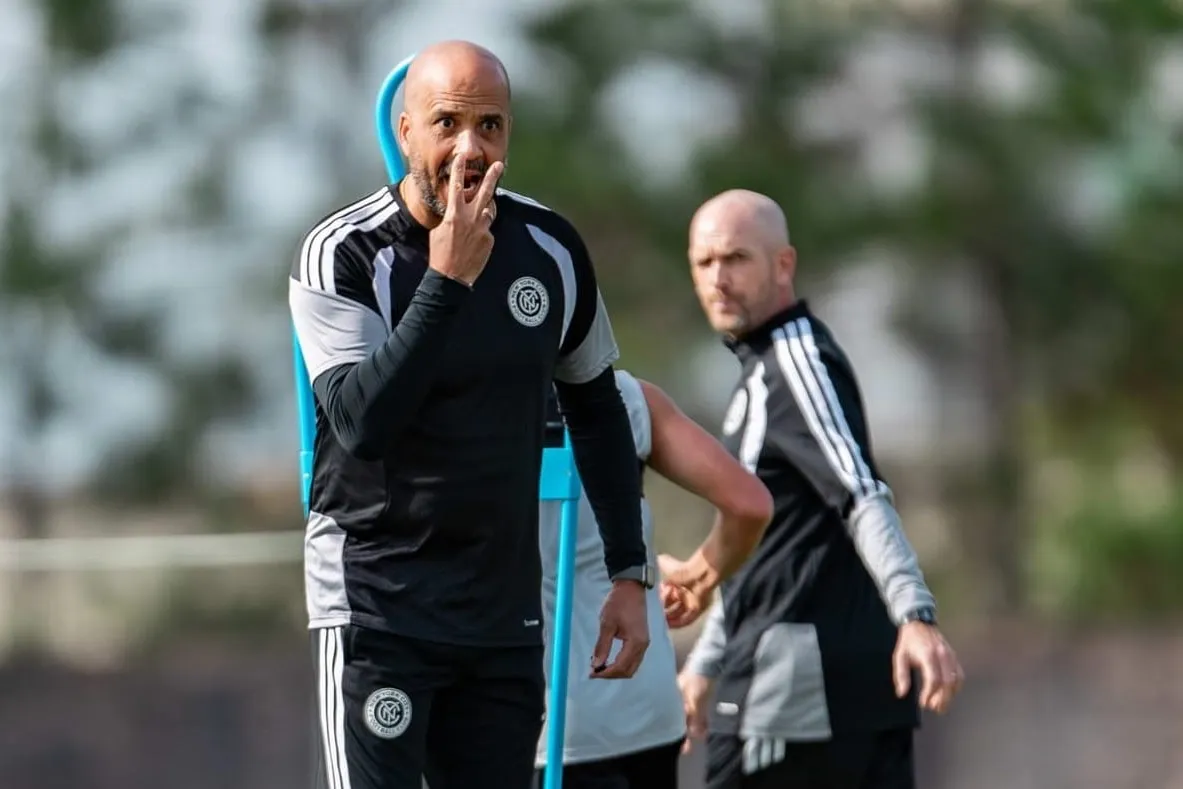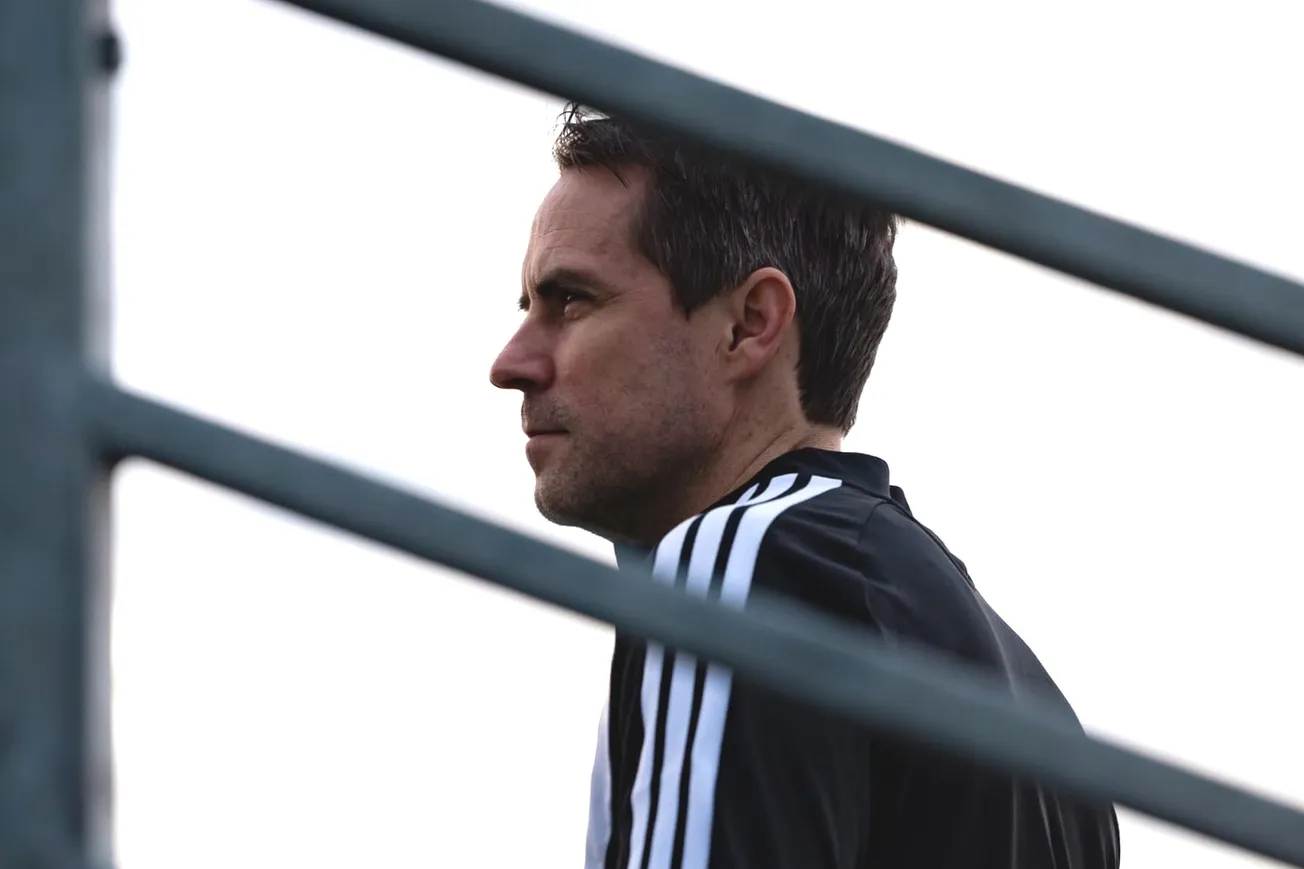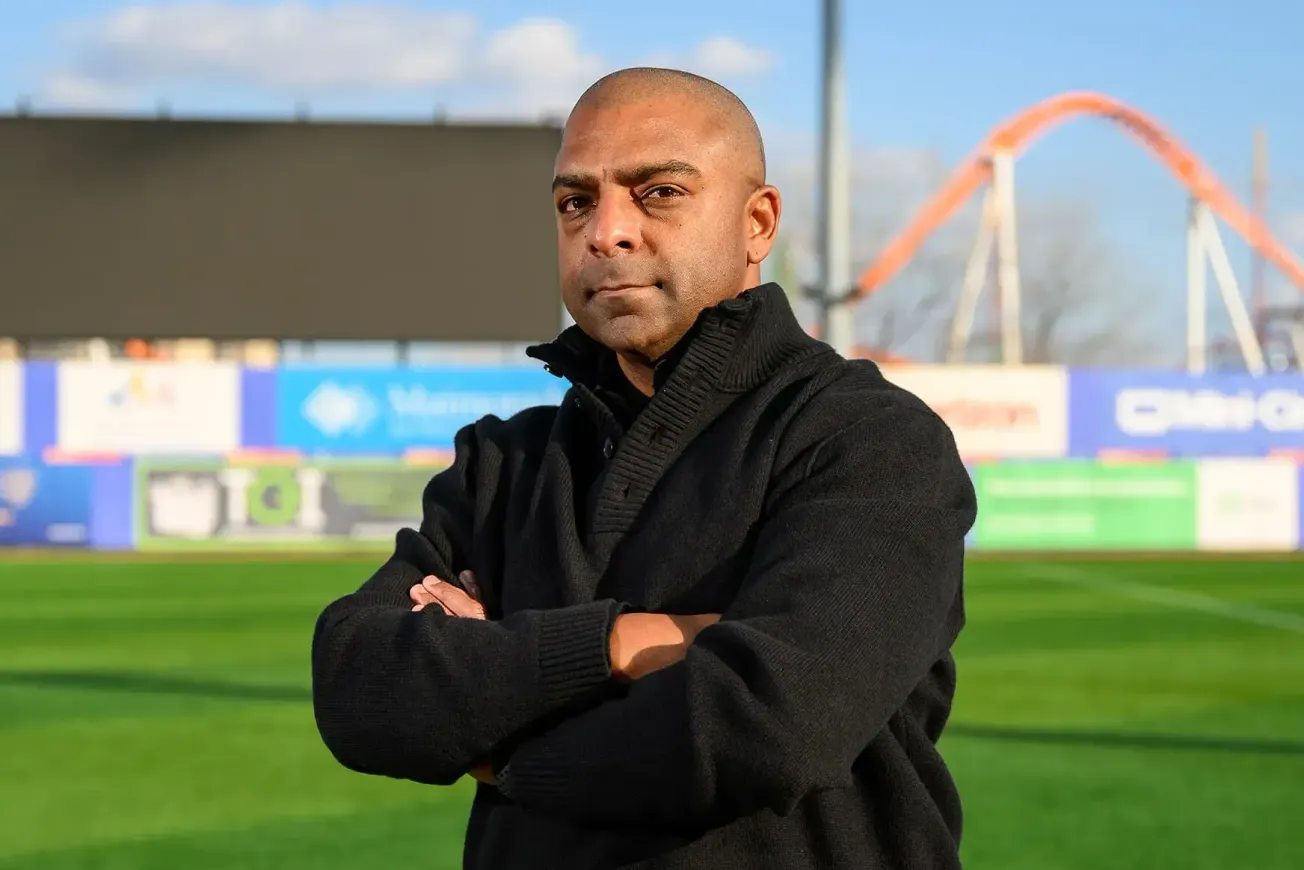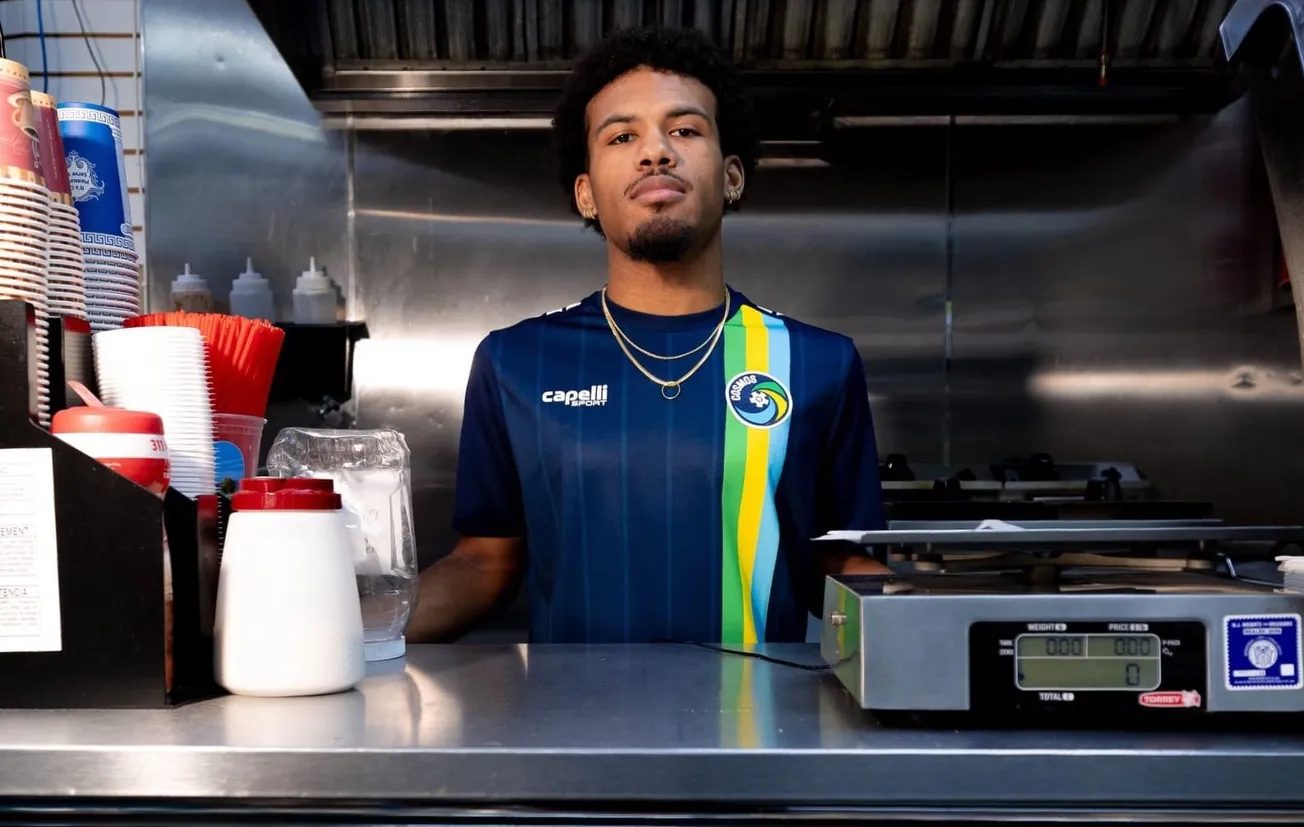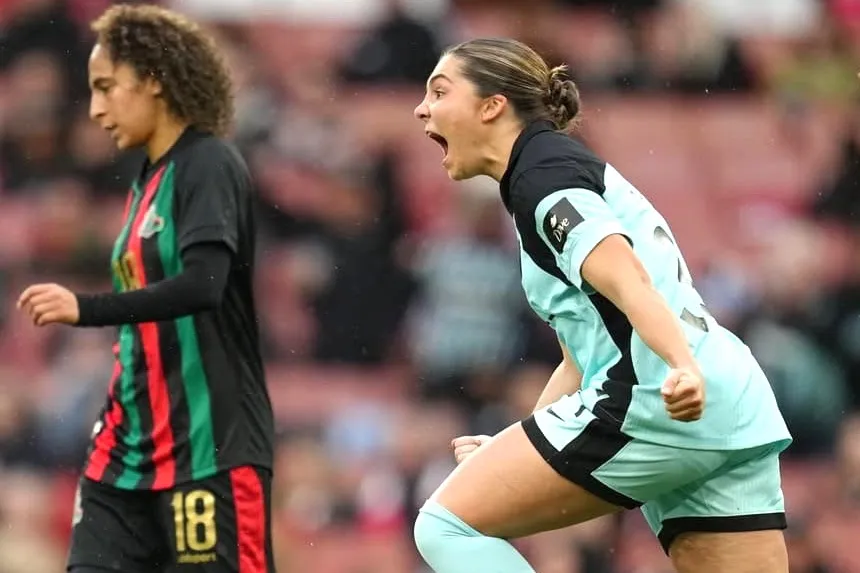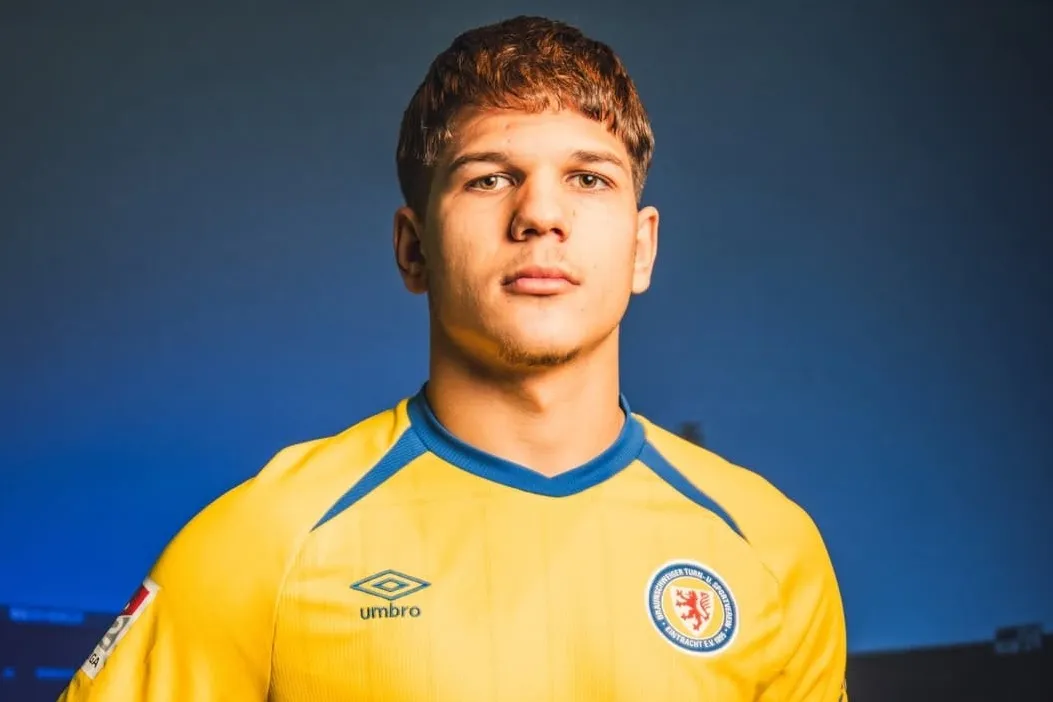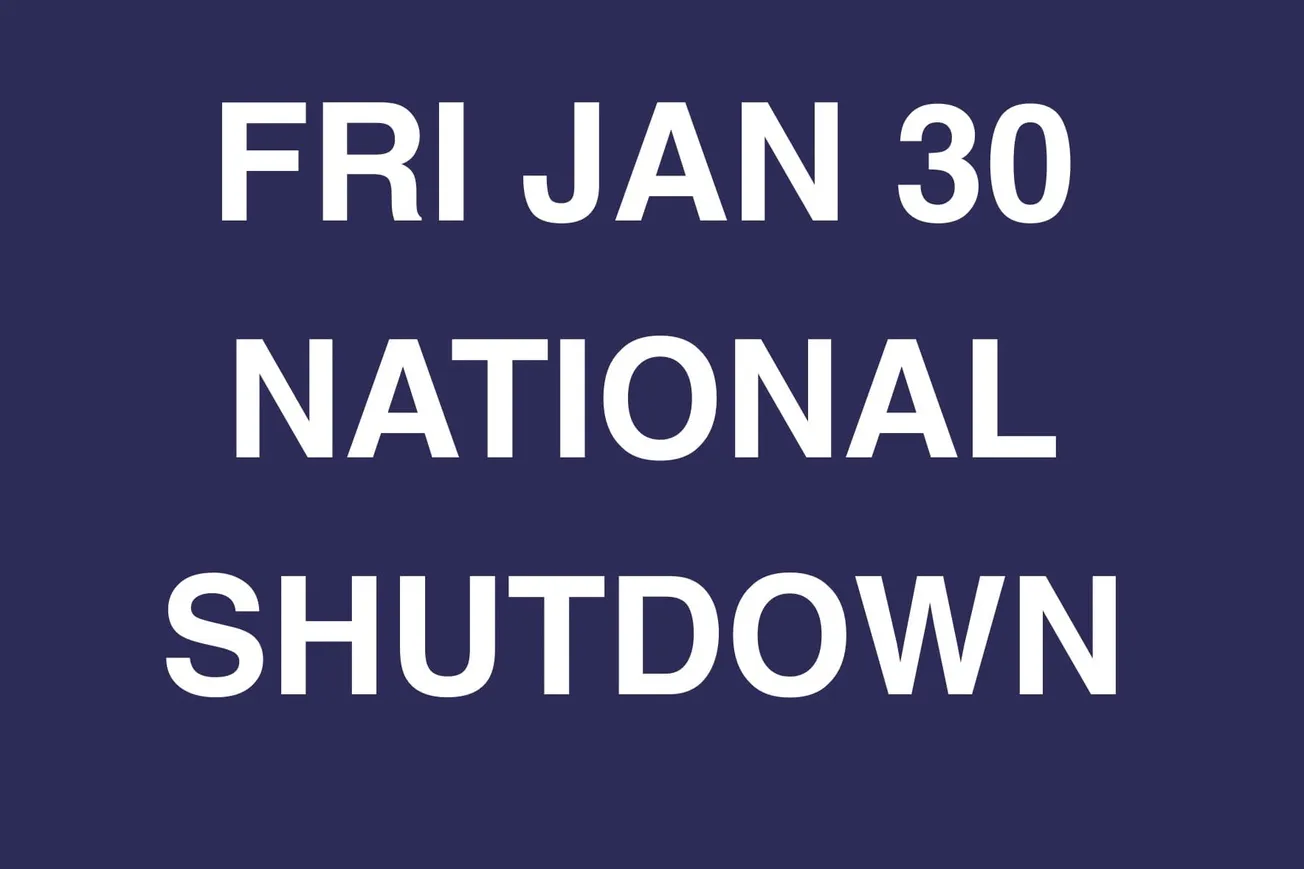Yesterday, members of the media sat down for a roundtable discussion with New York City FC President and CEO Brad Sims at the club's headquarters in Midtown Manhattan. It was the first time this season that Sims was made available to the media, and he addressed a variety of subjects.
Note: The statements below were edited for length and clarity.
As the CEO, what do you believe is the overall transfer philosophy of New York City FC at the moment? How do you decide who to bring in?
Brad Sims: "Over time, we've been very particular about who and when to bring players in, and do a lot of homework. It's been clear that nothing derails teams in this league worse than making wrong signings. The way the rules are set up, if you make a bad signing, someone ends up being not great...more off the pitch, honestly, in a lot of these situations, locker room situations.
You're locked in a contract for three, four, five years, it is devastating from a team development standpoint and an on-pitch results standpoint. We're looking for talented players that fit into the way City Football Group clubs and New York City FC wants to play football. Also, really focus on top-notch people, good people that are going to be good teammates, that are going to be good in the locker room, that want to win, that don't have ego.
There's a lot of players around the world, but you've got to find players who want to come to the US, want to come to MLS, want to come to New York City. Then you've got to find, do they fit the profile on the pitch that you want, that we want, and do they fit the profile off the pitch that we want? It's hard to thread it all in. Is it the right position, at the right time, at the right price? So that's a lot of variables, and so it's hard, especially with the bigger signings, it's hard to find players that check every single one of those boxes. I would say that there's probably a number of teams, or maybe many teams in the league, that if someone doesn't fit, check all those boxes, and check most of them, though, or half of them, like, OK. We're a club that I don't think really will go get someone unless they check all of them, which probably limits the pool, makes it really tough to do business.
When we get players, we feel really good about the players we get. We haven't made, I don't feel like, maybe you guys will call me out on this, but I don't feel like we've made any mistakes with players off the pitch, in the seven years I've been here. Some players maybe did not perform up to the level that maybe we thought they would on the pitch, but I don't know that there's anyone that we've missed with off the pitch, and that's what kills a team. It kills teams."
Is there an overarching model for the way NYCFC operates in the transfer market, and are they a selling club?
Brad Sims: "We want to win, first and foremost, but we want to do it in the right way, we want to do it in a responsible way. We have financial realities based on how we operate as a tenant in the most expensive market in the league. So I think that it causes us to also be even more particular, to make sure that we make the right calls on players. We don't feel like we want to overpay for players. We have a lot of amazing resources from the City Football Group level, in terms of player valuation models and projection.
We find the right player for what we need on the pitch, the right player for what we are looking for off the pitch, at the right time, right price, and they check all the boxes. I think that over time, the club has been pretty successful. I don't view us as a selling team. I mean, we had our all-time record signing in the summer window.
We sold two players, but mostly at their request. I think that we also want to be known to players around the world as a club that does right by players. So if we were selfish, and we say, like, 'Taty Castellanos, sorry, you got a long term contract, you're going to play your contract out here.'
There are clubs that operate that way, and we're not one of them. He has a dream to go to. Would we be better if he wants to play the whole rest of his career at MLS? Probably, right? James Sands, like, dream to play in Europe. Went over, had a spell, came back. We said, hey, if you come back and you have a great year with us, we'll help you.
Now he's back and kicking ass in the Bundesliga. We want to help. We haven't gotten anything, they've been free loans, but we want to do it right. There's a guy, Homegrown, helped us win a championship, has done everything that we've ever asked of him, and all he's asked of us is, can you help me fulfill my dream of playing in a Big Five league in Europe. So we do that.
By the way, I think that to be able to recruit a player the caliber of Nico Mercau, a player in his prime, who, if there was an MVP award for the La Liga 2, he would have been the MVP of that league last year. He could have gone anywhere in Europe. Big La Liga teams want him, big teams in Argentina want him, big teams in Brazil want him.
We're able to tell a story, a really compelling story, about who we are, how we like to play, how we treat players, learning what his career goals are, and letting him know that if he comes here and upholds his end of the bargain, we will help him achieve his career goals, that is what enables us to get a player of that caliber to say, all right, I'm in, I want to go to New York City.
So I think, time and again, if we're able to tell these stories, in the long run, it's helpful for us as a club, recruiting players, getting players to sign long-term deals with us when they might not want to otherwise, because they know that, hey, if we'll do right by them at some point during this, that if it's year two of a five-year deal and they get their dream offer, we're not going to say, 'Sorry, you signed a five-year deal, you're here.' That enables us to do business like that.
And I think that that's the right way to do it. That's the club we want to be. I think we have a reputation around MLS, and now, we're able to tell that story around the world, to a Nico Mercau, and that is helpful now, will continue to be helpful for us in the long run.
We sell when the player wants to go, really, but we're not out there trying to sell players to make a profit. We're trying to win first. Second, we're trying to help players achieve their goals in their career and their lives, and we're trying to do both those things in a way that will ultimately benefit the club, the individual, and our fans in the long term."
Can you go through the process of firing Nick Cushing, what that was like to make that decision and to go through it with him, and then to get Pascal Jansen?
Brad Sims: "Those things are always tough decisions because it's a human, a father, a family, and someone who has done a lot with our company. So yeah, a very tough decision, not one that was handled lightly on our end.
I think, ironically, I feel like most of our fans thought the year before that should have happened, and then maybe were surprised when it happened when it did. Ultimately, we wanted to get someone, we invest a lot in young players, as you guys know. We really invest a lot in our Homegrowns, and it's tough to find...being a coach, I think Nick probably felt he was on the hot seat in maybe almost his entire tenure with the club. He came in a tough situation as the interim, and when that is the case, you are measured by what's on the pitch, you're measured by your points, you're measured by how far you go, right?
I think a lot of coaches in that situation are just going to be like, 'I'm going to play the players that are most experienced or that are going to give us the best chance to win, because if I don't win, I face the consequences.' By the way, I don't blame that kind of mentality one bit. I would have a hard time putting myself in that, that's a tough situation to be in, a tough profession.
You never know until you get somebody in, but it's interesting, with Pascal, when we looked at the profile of the coaches that we were looking at to replace, I'd say, two things that we were looking at.
Again, a lot of credit to our global football organization and kind of the data that we have on every single club in the world and scoring every player in the world and every team in the world and where we think their projected finish should be.
And then you have coach-influence scores based on, 'We think the team is this good, but they actually finish here,' and that can be positive or negative coach-influenced. So it's like, how do we find these coaches that are doing more with their talent than the data suggests that they should? Maybe they have that, whatever that 'it factor' is, motivating that kind of stuff.
So that's, if we look strictly, really focused on a short list of coaches that were there, Pascal ranked very, very high globally on that list, on this whole global list.
And then you dig deeper into, what percentage of minutes do they give to players under 23, under 21, under 18? What kind of confidence level do they have?
So that was a good second thing, because we know that we feel like we produce a lot of talent from our Academy, that we recruit younger players, we want to grow and develop players, and then we sprinkle in a good mix of prime age players, development age players, etcetera.
So we wanted someone like that. I mean, he ranks so high on both those metrics, and then also just his mentality, calmness, and calm, thoughtful, strong, man-manager, communicator. That's one thing that I think is really important, especially with young players, but all players. All players want to know where they stand, and what they need to be doing better, and if they're not starting, or if they get dropped from the starting lineup, why, and what do they have to do to be playing a week, and I he's done all of that, and so we've been very, very pleased from that.
I'll give you a real example. During the summer window, obviously, we sold Mounsef [Bakrar]. Mounsef, he came here to be a starter, and Alonso [Martínez] has won the job and run with it, and has been incredible.
So Mounsef, and again, going back to the previous question, we were selfish. Mounsef, some people may disagree, some of our fans may disagree, in MLS, Mounsef is a really, really strong number two, back up No 9, as a second-choice No 9, really strong. Some of our fans may not agree with me on that, but we feel, really strong.
He doesn't want to be a backup. He wants to go start. He has a chance to go to Europe and start. Again, previous question, do right by the player. He was great in the locker room for us always. He maybe didn't live up to exactly where we thought, scoring a number of goals that maybe we had anticipated when we signed him originally, but amazing in the locker room, did everything that was asked of us, had an opportunity.
So naturally, Dave [Lee, Sporting Director] goes to Pascal and says, 'Alright, we're going to go recruit and go get a replacement for Mounsef,' and Pascal's like, 'Why? We've got Seymour Reid.' Dave's like, 'Yeah, we love Seymour, but he's 17,' and he's like, 'We're good. We're good with Seymour.'
Well, I mean, it's nice to have three, probably, sometimes you know we're going to have this gauntlet of games, and Alonso can't play every game.
He's like, I'm good with Seymour. Earlier in the year, and going into the summer, we're lacking the depth we wanted in the midfield with some injuries and other things like that, so we're going to go get another. 'We're good, we've got Johnny Shore,' and we're like, yeah, but he's 18, let's go get some more depth. 'No, if we need someone to play minutes, Johnny can play minutes.' OK. And he's not just saying that because he thinks that's what we want to hear that saves the club money, he loves those players and he thinks they're going to be great, and he wants to develop them, and that's the way he looks at it. Not many coaches would do that. Johnny and Seymour would never see the pitch from the vast majority of coaches in our league and in most leagues, never see the pitch. I give him a ton of credit.
The level of rigor that we kind of look at when we bring a player on the front end, same with a coach. It's been great so far. I think we're not complacent, we feel like we're happy with where we are, but the next six games are going to be, the next three games, everything, it's going to be, it's a tough Eastern Conference this year.
I'm not taking anything for granted, these guys are going to come play their asses off and keep it rolling here, so a lot still to accomplish this year, but Pascal's been fantastic. Dave, I would say Dave was like, we did all this research on the front end, and he's like, 'This is the guy.' We brought others in, we did the whole thing, and he was like, 'That's the guy.'"
What's your opinion on a possible MLS schedule change to align with the European calendar, what will the timing will be, and might it affect design aspects of the stadium to accommodate more cold-weather games?
Brad Sims: "I'm in favor, and the club is in favor, of switching. I think the vast majority of the clubs in the league are in favor.
It was decided not to do it for 2026, logistically, not able to do it. I was in favor of doing it in '26, to me, it made a lot of sense, if we're going to do this, let's do it coming out of the World Cup. Kind of reposition the league at the most biggest possible moment of strength, I would have thought, but weren't able to get all the ducks in a row on that.
So now I'm in favor of doing it in the summer of '27. If it doesn't happen then, then I will be in favor of doing it in the summer of '28. There's a lot of things that need to happen. There's a collective bargaining agreement, the league can't just vote and implement this. We have a collective bargaining agreement, the MLS Players Association has a say in it, they would have to sign off on that. Collective bargaining agreement runs through '27, so it would take opening that up early and getting a new deal done, and I don't know what the deadline might be.
There's no drop dead date of which they'd have to figure that out to do it summer of '27, so I don't know. I think if I had to guess, I think that there's enough momentum that it would happen, and it's more of a question of whether it happens in the summer of '27 or summer of '28. There's obviously some very real challenges for cold weather cities. I think more so than New York. I think for us, we're building a brand new facility, we have a contingency plan. We've set up knowing that it's cold. We endeavor to play through December now every year anyway. We play playoff games in November, it's fine. I would love to, if we were ever to host an MLS Cup in December, we would be ready to do that. We play games now, home games, starting like the second week of March. To me, the way the new schedule would happen, there would be a winter break. The league has done a ton of due diligence on that. Clubs have been involved, feedback, a ton of work over the last number of years. So they've thought of everything, everything's out there.
It would be likely a six-week winter break, probably from the second week of December through January. So you'd play last week of July through second week of December break, roughly February 1 to May 1, and then playoffs May 1 to June 1, uninterrupted by any FIFA break. Nice weather, no NFL or college football going up against, it's ideal. MLS owns the month of May. NBA and NHL, conference finals, finals are in June. You're only up against early-season baseball and first and second round NBA and NHL playoffs pretty much. It gives MLS a chance to really own a month, I don't think there's a better time to do that.
Selfishly, for us, in New York, Etihad Park, then all of a sudden, your two off months, full off months, other than January, your off months are June and July. I got an outdoor stadium, June and July in New York, I think that there would be interest in having events there, concerts, international friendlies, everyone pre-season coming over, like CONCACAF Gold Cup, FIFA Women's World Cup, you name it.
Any major event that is happening between 2027 and 2035 that has been scheduled right now has called us and wants to have their event at Etihad Park. Rugby World Cup, like literally any event that's on this, they want to go there, and those are all in June and July, plus concerts and everything, so I think we would do pretty well in that schedule if we didn't have any soccer games in June and July, or any MLS soccer games, financially.
It's something that we're strongly in favor of, but I think the biggest advantage for it, by far, is the ability to really strengthen the product on pitch for MLS.
Right now, we're in a situation where MLS teams try to buy players when teams around the world don't want to sell them in January and February when they're in search of them. The market to sell players is only when everyone else wants to buy them, which is when MLS teams don't want to sell them, because there's only eight to 10 games left in the season in July and August and the stretch run. You're doing well, we don't want to sell our best players now, and so a lot of teams don't, and so then they miss out on a revenue opportunity because they don't sell their best players when other teams want it.
What actually ends up happening is, because of that, a lot of clubs around the world don't even really scout MLS as much as they would or should, because they just assume that teams aren't going to sell their best players. Players may not want to come to MLS because of that situation, because they don't want to be in a situation where they're stuck here, where there could have been a market for them somewhere else, but they're not even getting a look because their perception is that their team won't sell them because they're here and it would be a stretch run.
All these reasons, so essentially, we're missing out on opportunities on the buy side. We have to overpay in January or February as a team, which is why we haven't done a lot of big-dollar transfers in January and February, historically, because you might have to pay 20%, 30%, 50%, 100% premium to get a guy. Look at the transfer fees that went around the league this last January or February, and then check and see where their teams are in the standings right now.
Whereas you can get a guy like Nico Mercau in the summer because the team knows that that's the time to move him, and so we're buying when someone wants to sell instead of buying when someone doesn't want to sell and they've got all the leverage. All those things, then, players are more likely to want to come here. When they leave on frees, if anyone ever leaves on a free, it's when the whole world is doing business, instead of if you leave on a free in January when everyone's got their roster set. Everything about it is a huge win for the league from a player quality standpoint coming into the league and the ability to sell on the outbound and generate more revenue. Both ways, it's a big difference."
Can you discuss what happened with the stadium construction deal that was reportedly done to build in the South Bronx?
Brad Sims: "The real reason is not what was reported, like the Yankees and the parking and all. I mean, this was a hugely complicated site, and we only have a certain amount of time here, and I wanted everyone to be able to ask a question.
It was a super complicated site, like 17 parcels of land. So it wasn't just parking lots, it was all these different warehouses, different parcels of land. One functioning business, which was an elevator company, and essentially, we had to cobble together all 17, and if you only got 16 of the 17, or 13 of the 17, it doesn't work. You need all 17. So we're trying to do deals, and every deal was contingent on every other deal happening, so you need an absolute perfect exit. You need everything to work out. We had the elevator company, we had it on these options, and we kept extending options, extending options, all these were options, because we can't buy, we can't be out. We didn't want to own three of these properties, or seven of these properties, 11 of these properties, and then the rest fall through, and what are we going to do with these things now, right? So it was just hugely complicated.
Really, the biggest thing, and we had to kick the can so many times on the road, as we're trying to negotiate all those deals, the elevator company ended up getting bought by a private equity company. We had to try and explain to them, and by the way, the elevator company was literally where the pitch was going to be. It was like the center, right in the center, and private equity bought them.
The previous owners, who just kept giving us free options, that group didn't want to do that, and we were already working on finding a replacement. We had replacement sites, because we were going to have to pay for them to relocate. We wanted to keep them in the Bronx, we had all these sites for them, and the company was like, 'We don't know what we're going to do with this company yet, but we're not prepared to want to sell it after just buying it.' That part was, if we didn't have that, we weren't going to be able to get the rest of it. Obviously, there were issues with the parking, but it wasn't like we had everything, and then that killed it.
It was a house of cards, and everything would have needed to work out perfectly for it to happen, and it just got delayed too many times.
The mayor, who was term-limited out and was leaving, and the EDC – you guys saw all the political process of everything. We had an EDC person that we had been working with on that one for years and years, that person left, people were leaving the administration. Then the interim person who had been that person's right hand came on, we started working with them for a month or two, then they left for another job.
Then a second interim person came on, and that person said, 'You can deal with the next administration on this.' Between all of these things, it just fell apart.
We had the whole stadium designed. We did, there's concept design, schematic design, then detail design. We were at 90%, we were choosing the upholstery on the chairs and the suites. That whole stadium in the Bronx was fully designed and ready to roll.
I'll tell you what, it would have been, obviously, sooner, if there hadn't been a pandemic, there hadn't been all these other things, that would've been great. This place is going to be so much better than that stadium would have been, by orders of magnitude, for a bunch of reasons, I think from a fan perspective. Every year that goes by, you learn more, more innovation happens. We visit more stadiums and arenas.
The design of the stadium is so much more evolved than the design would have been, five years earlier, we're having an extra four, probably three, four years of just learnings and best practices and design know-how. Where we are, we're building what's going to be an incredible sports entertainment district. It's going to be the sports entertainment hub of New York City, between USTA, the Mets, everything that we're building from a mixed-use standpoint, I think this is, selfishly speaking, but we're doing something amazing for a community.
There, it was a stadium, we're building a stadium, which would've been great for our fans. Here, we're building its biggest public housing project in four decades in a city that sorely needs affordable housing. Ultimately, this is going to spur 60 acres of development in Willets Point. We'll see what happens with the Mets and their development project, but if they get done what they hope to get done, USTA is doing a massive renovation.
This is going to be an incredible place, overall, in this area. I'm a big believer in what's meant to be is meant to be. For us, also, from a fan base standpoint, this location does not have any impact on our Manhattan fan base. It either doesn't have any impact or has a slight positive impact on our Brooklyn fan base. It has, obviously, a very positive impact on our Queens fan base, which is an amazing soccer hotbed and soccer fans. No impact or slight positive to Westchester County, which is a big, big fan base for us, and especially in some of our hospitality and premium seating areas. No impact or positive impact to Fairfield County in Connecticut, where we have a significant following, and just essentially opening up almost an entire new market for us on Long Island, which is a huge soccer hotbed of 4 million people.
Going to the Bronx from Long Island is kind of a non-starter for the vast majority of people, and it just opens the floodgates for us there. So I think that we feel we own the five boroughs already, and Westchester County, and Fairfield County, and now we're adding the whole of Long Island to our potential fan base, and it's really going to be really significant for us."
Will there be rules about hosting home games during late August in Willets Point when the Mets and US Open tennis are happening?
Brad Sims: "Yeah. We have an agreement with the Mets, for any Mets game, so we don't go head-to-head with the Mets at the same time. We can go same day, but they have to be staggered afternoon and evening. USTA is based on, they have to approve, which is the same case now. So we played home games during the US Open at Citi Field, I think, in two or three of the last four years. Essentially, just asking USTA for approval. W're trying to get one approved during the US Open next year, as well, we're working with the USTA on that now.
That's a little different because it's the second week. So the first week, we've always done the first week, Mets have played games. The Mets are also beholden. So technically, the Mets can't play any home games for three straight weeks, including the week before the US Open, but the US Open, they're reasonable, nice people and good business people and good people to work with.
Every year, they give the Mets the ability to play games, and every year, they've given us the ability to play games. So we don't anticipate that's going to be any different."
Alonso Martínez has become a top player for the team. How do you handle his popularity in the transfer market, given that he's having such a good year?
Brad Sims: "I think it's going to, in a lot of ways, depend on what Alonso really wants. I haven't had that conversation with him directly. I know he's really happy here. I think it might be a different kind of situation than Taty Castellanos. Taty started, he was in Uruguay at out club there, knowing that the US, that MLS was a big step up for him from there, but he always had this dream, his whole life, as a South American, wanting to go and play in European leagues, and saw that he was going to have a chance to do that, and wanted to take that opportunity.
Alonso was at our club in Belgium, in Lommel, when we brought him here, so he was playing in Europe at that level. I don't want to just assume that every single soccer-playing boy in the Western Hemisphere, ultimate dream is to play at somewhere in Europe, I don't think that's a fair assumption to make.
He really has developed here significantly, and he likes it here. It might be, it may be a different situation. He may be someone who would like to stay in New York for the rest of his career, and score 15 to 20 goals every single year. We would be very happy if that's what he wants to do.
He may also say, oh my gosh, I got this opportunity to go here, and I would really like to take advantage of it. As I mentioned before, without knowing all the situations, we are the type of club that wants to help our players achieve their dreams. If you really wanted to go do something, then we would entertain that.
I will say one thing I do know about many players around the world that have the honor to play for their national teams, that that's really important to them, but I do know with Costa Ricans, it's like next level important. If you're playing regularly all the time, and you're playing at a high level, and that's enabled you to get to the national team, and we would say, you know, we had similar conversations with Matt [Freese], you know, about, there's probably a lot of interest in Matt, around the world as well.
But being here, dominating, you know...if Matt was a backup keeper in the Premier League, or maybe a starter in a second division, I don't know that he'd be the starting keeper for the US men's national team right now. Because he's in the U.S. and MLS, and dominating every week, that's provided him the platform to do that, and I feel like that's been the case with Alonso. We would argue that if you want to continue to be in those positions, this is a great place for you to position yourself well, to continue to be a starting No 9 for the Costa Rican national team and to continue to be the starting goalkeeper for the US men's national team.
Ultimately, when and if those situations arise, we'll have the conversations with the players, and we'll see where that takes us. Selfishly, I'd love for those two guys, and others on the team, we love the squad we have, to be with us for a long time, and that's what we want to be building, a team that can be competing for championships, in '25, '26, '27, '28. You know, we have a great, great core."
Update on the construction status of Etihad Park? Any update on a possible second team on the lease to use the stadium, a potential women's team or a second division team, whether it be NYCFC II or not?
Brad Sims: "I'll start with the second question first. If we were to have another tenant in the stadium, the plan would be for that to be a women's team, not a second division. NYCFC II, we have no plans for that to be a full-time tenant in the stadium, or any other kind of lower-division men's or women's teams. I think that the only type of full-time second tenant we would want in there would be a first division women's team. So that would be the aim, and that would be the goal there.
First question, I mean, the stadium, couldn't be happier with where it's going. I'm telling you, and I've been part of building a couple NBA arenas and a couple baseball stadiums early in my career, and I felt like there was stuff that went wrong all the time. There were always fires, you know, construction stuff, and you're dealing with stuff, there was always stuff going on. So I fully anticipated this process, like, once we got going, and especially, based on kind of the history of where things go, I'm like, it can't be easy, there's no way that this is gonna be easy, there's gonna be crap that's going wrong all the time.
Knocking on wood every time I say it, I get no calls of anything that's gone wrong. It's always just updates about how everything is going, you know, better than anticipated, and better than, like, they were planning on installing 30 pieces of steel a day, and we've been doing 50 on average. Every day it's good news and no bad news. So hopefully that continues. I'm over there every once in a while. I haven't been over there as much as I thought I would be, because nothing has gone down, no crap has gone down.
We've said all along the goal would be to play opening day 2027 at Etihad Park, and everything is fully on schedule for that to be the case. We anticipate playing the whole season there, and if everything continues the way it's continued, I don't foresee any issues with that at all."
Will the club use space in the new stadium, like the Supporters' Porch, for away-day watch parties, or other kind of events?
Brad Sims: "100%. That's gonna be the coolest watch party spot. Also, not just away day, whatever big events, we could do watch parties for anything there. World Cup '30 watch parties, or, you know, Women's World Cup games that aren't at our stadium, watch parties, things like that."
Regarding a women's team at Etihad Park, is that a conversation you're already having with current NWSL teams, or are you looking at maybe a new NWSL team?
Brad Sims: "I mean, for us, however we can host top-flight women's soccer at Etihad Park, we're exploring all those options. The team currently in our market plays in New Jersey. They have a lease there for a number of years going forward.
They have ownership that has a lot of roots in New Jersey. So there's a lot of considerations for them. Really great organization, you know, we are big fans. We work with them on a lot of different things. I take my family to games. I have two young daughters, they love it. Carolyn Tisch Blodgett is fantastic, her team around there is fantastic, we're all big fans of them, but they have a current home. They have things to think about. I think they would be a great, great team to have in Etihad Park, but one way or the other, we'd like to have top-flight women's soccer at Etihad Park, and as soon as we possibly can, so we'll see where it goes."

